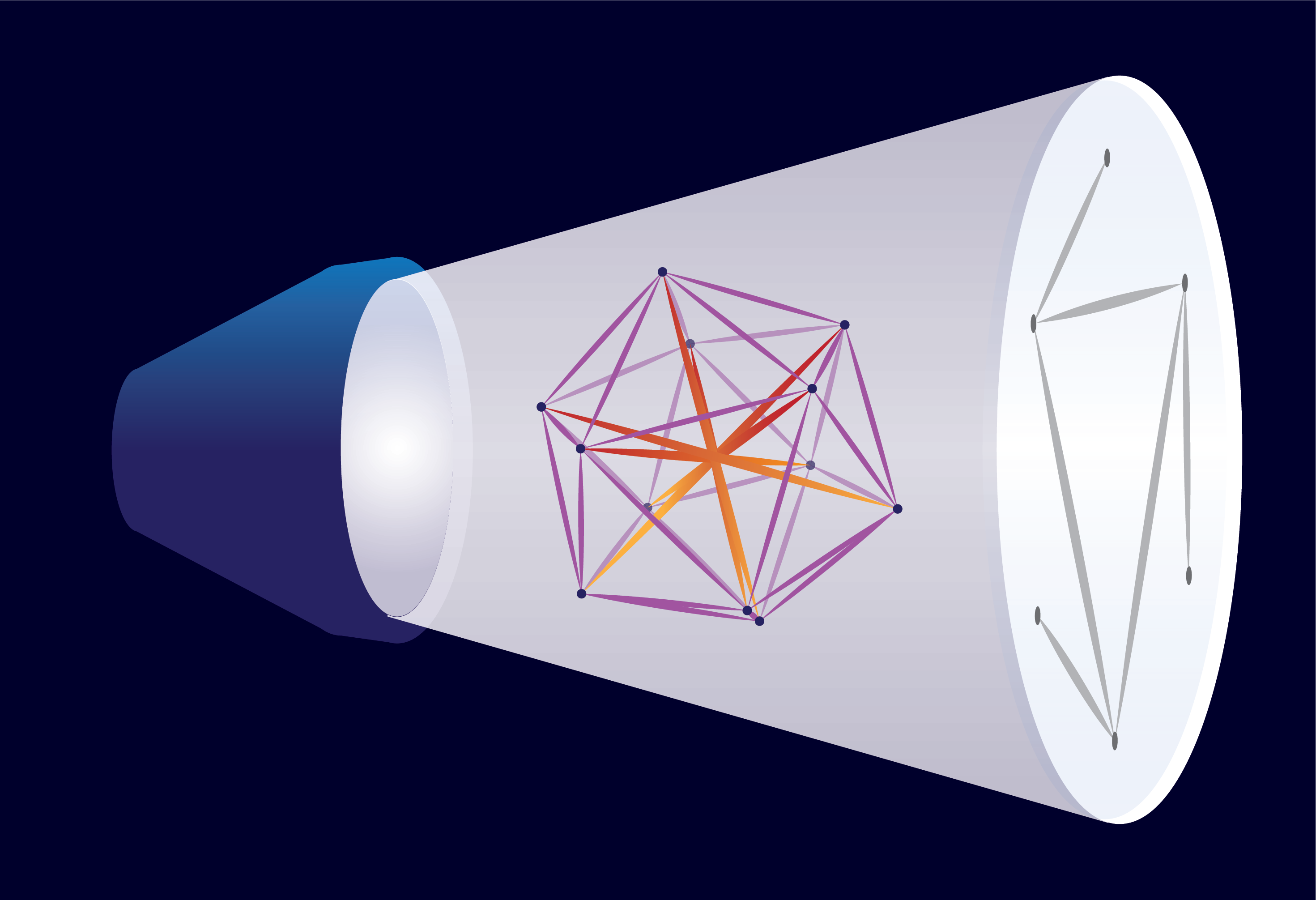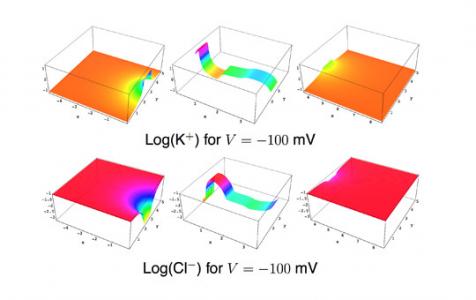Solving today's problems
With grants from the National Science Foundation, Department of Defense, National Institutes of Health, National Security Agency and more, our mathematics and statistical sciences faculty are leading game-changing research projects. Graduate and undergraduate students have the opportunity to be a part of this exciting work.
Conducting research allows you to deepen your understanding of theoretical mathematics, to explore the ways in which we apply mathematics to engineering and other sciences, to test your theories on math education, to see how statistics intersects with various fields, and more. Research opportunities abound in all four of our major focus areas.
Header image courtesy of Eleni Panagiotou - A protein (human ubiquitin C-terminal hydrolase, UCH-L1) that has been implicated in neurodegenerative disease adopts the shape of a complex knot, whose role remains to be determined.
Applied Mathematics
Applied mathematics encompasses mathematical modeling and the development of computational tools often motivated by some area of application in the natural or social sciences or engineering. Our vibrant group in Applied Mathematics has strong interdisciplinary connections with the schools of engineering and life sciences as well as institutes such as the Bio Design Institute, the Mayo Clinic, the Global Institute of Sustainability, and the Complex Adaptive Systems Initiative. The applied math faculty is well funded through grants from NSF, NIH, defense agencies and others.
Computational Mathematics
Steven Baer | Johannes Brust | Heyrim Cho | Malena Español | Zdzislaw Jackiewicz | Eric Kostelich | Juan Lopez | Alex Mahalov | Fabio Milner | Sebastien Motsch | Eleni Panagiotou | Rodrigo Platte | Rosemary Renaut | Bruno Welfert
Mathematical Biology
Steven Baer | Heyrim Cho | Sharon Crook | John Fricks | Adrian Gonzalez Casanova | Eric Kostelich | Yang Kuang | Juan Lopez | Fabio Milner | Sebastien Motsch | Eleni Panagiotou | Joan Ponce
Nonlinear Dynamical Systems
Steven Baer | Donald Jones | Eric Kostelich | Juan Lopez | Alex Mahalov | Fabio Milner | Sergei Suslov | Wenbo Tang | Bruno Welfert
Probability
Adrian Gonzalez Casanova | Eric Kostelich | Nicolas Lanchier | Alex Mahalov | Sebastien Motsch | Wenbo Tang
Data Science
Katrina Bossert | Johannes Brust
Actuarial Science
Systems and Control Theory
Theoretical Mathematics
Theoretical mathematics is the study of abstract mathematical structures which form the basic framework for the rest of the mathematical sciences. In large part, theoretical mathematics is inspired by intellectual curiosity. Theoretical mathematics provides the tools for scientific discoveries in the future, often in unexpected ways.
Discrete Mathematics
Andrzej Czygrinow | Susanna Fishel | Zilin Jiang | Hal Kierstead
Analysis and Partial Differential Equations
Agnid Banerjee | Donatella Danielli | Nicola Garofalo | Steven Kaliszewski | Alex Mahalov | John Quigg | Sergei Suslov
Geometry and Topology
Matthias Kawski | Brett Kotschwar | Eleni Panagiotou | Julien Paupert | Franco Vargas Pallete
Number Theory
Nancy Childress | Florian Sprung
Algebra
Mathematics Education
Mathematics Education is the study of how people learn and teach mathematics meaningfully. One of its major goals is to develop theories of learning and teaching that will be foundational for strategies and curricular materials that improve the conceptual learning and use of mathematics. The math-ed group at ASU is particularly interested in mathematics learning and pedagogy at the high-school and early college levels and on the learning process in traditional, flipped class models and online settings. Content areas include precalculus, calculus, and the transition to advanced theoretical courses.
Mathematics Education
Marilyn Carlson | Fabio Milner | Kyeong Hah Roh | Carla van de Sande
Statistics
Statistics is the science of collecting data, summarizing data, making sense of data, and drawing inferences from data. With research and decisions increasingly being data-driven, basic knowledge of statistical concepts and methods is becoming more important. Our faculty members apply statistics to research in a range of fields, including functional MRI, behavioral science, epidemiology, biology, medical imaging and network theory. Statisticians are often part of larger interdisciplinary research teams because, typically, they do not have ownership of data and collaborate with researchers who do. That, in part, makes being a statistician so much fun; as already noted by John W. Tukey, statisticians “get to play in everyone's backyard.”
Statistics
Dan Cheng | Douglas Cochran | John Fricks | P. Richard Hahn | Ming-Hung Kao | Shiwei Lan | Robert McCulloch | Sally Morton | Mark Reiser | Yi Zheng | Shuang Zhou
Featured Research
Research News

Professor receives NIH grant to investigate relationship between protein structure, health issues
December 7, 2023
Innovative approach uses 'knot theory' to combine new mathematical tools and apply them to molecular dynamics

Mathematicians solve long-standing geometry problem on equiangular lines
February 21, 2022
For more than 50 years, mathematicians have been pondering a problem in discrete geometry concerning equiangular lines — how many such lines can exist simultaneously in a given dimension? Zilin Jiang and a team of researchers at MIT recently solved this long-standing problem.

ASU receives 16 NSF CAREER awards
June 28, 2021
Researchers at Arizona State University have earned 16 National Science Foundation early faculty career awards, dating back to late 2020.



